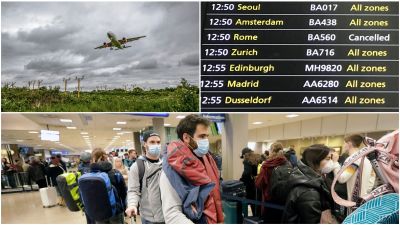What are my travel rights amid the coronavirus pandemic?

The spread of coronavirus has severely disrupted the travel industry.
Many countries around the world have closed their borders, and many more require all travellers to self-isolate for 14 days in an effort to curb the pandemic.
Major airlines - including Ryanair, British Airways and EasyJet - have said there will be "significant" cancellations over the coming months, with a huge reduction of seats available.
If you have a trip coming up, here's what you need to know about your rights.
Consumer rights expert Martyn James gives some advice to travellers worried about coronavirus.
Can I still travel?
The Foreign and Commonwealth Office (FCO) is warning against all but essential travel to every country.
It advises the Covid-19 crisis has led to "unprecedented" border restrictions, and has made international travel "significantly" more difficult.
As far as the Foreign Office and most travel insurers are concerned, "essential travel" does not include holidays.
Many airlines are still selling seats over the next few months - some at inflated prices - but the Foreign Office advises to check their advice before booking.
What happens if my flight gets cancelled?
If you're flying out from a UK airport, or returning to one, and your flight is cancelled, you'll be entitled to a refund under a European Union regulation, called EC261.
Your airline will inform you if this happens, and in some cases you may be able to negotiate to postpone your flight to later in the year.
Some companies have been slow to provide refunds and others have given vouchers instead of the cash people are entitled to by law.
If your flight is cancelled and you find yourself stuck in another country, then your airline or travel company will make arrangements for you to return home.
If your flight home is delayed by more than two hours, you may be entitled to assistance, including accommodation and food and drink.
Will I get a refund if I want to cancel my flight?
Here's where it gets tricky - it depends on whether you have travel insurance, what the government's advice is, and your medical situation.
If you have travel insurance and you're travelling during the period that the FCO has strongly advised against, then your policy may cover non-refundable cancellation costs, according to the Association of British Insurers (ABI).
Also, if you have received medical advice warning you against travelling to your destination, your policy may cover these non-refundable cancellation costs too. You should provide a doctor's note to your airline, in this case.
If you don't want to travel and the FCO hasn't advised against "all but essential travel" to your destination, then it's likely your travel company's normal terms and conditions apply - making a refund unlikely.
Some airlines - including British Airways, Iberia, Lufthansa, Qantas, West Jet and Virgin Atlantic - have been offering customers "flexible" arrangements in the wake of coronavirus, such as changing the date of travel or destination for free, or offering vouchers instead of a refund.
Talk to your airline - even if it means a long wait on the phone - and keep your eye on government advice.
I don't have travel insurance for my upcoming trip. Is it too late to get it?
Many insurers - including the Post Office - are temporarily halting all sales on new travel insurance.
The ABI says there are still some policies available on the market, but warns many providers will be reviewing their offers as the situation develops.
"Insurance is based on assessing the possibility of an event occurring," the ABI says on its website.
"Insurers take account of when any risk becomes more of a probability than a possibility and then make commercial decisions."
If you booked with a credit card and paid more than £100 for each of your flights, you may be protected under Section 75 of the Consumer Credit Act.
This may protect you if your airline goes bust - an event that could happen with this level of unpredictability.
Will travel insurance cover me if I travel to a coronavirus-affected area, against government advice?
If you travel against government advice, you're likely to breach your travel insurance policies.
If you deem your reason to travel to an affected area is "essential", then talk to your insurer.
I'm overseas in a country and the FCO's travel warnings have changed. Will insurance cover my journey home?
The ABI says some insurers may provide help with out-of-pocket expenses in this situation.
Stay abreast of all changes on the FCO's website.
I've booked a packaged holiday. What are my options?
If you've booked a packaged holiday to a destination the Foreign Office has advised against, then you have the right to request a cancellation and choose an alternative package or receive a full refund of payments made to date, under the Package Travel Regulations.
If you're travelling somewhere else, buying a packaged holiday from a travel agent or online sometimes provides you with legal protection, called an ATOL - Air Travel Organiser's License.
It could allow you to claim a full refund or alternative flights if the airline, or tour company, goes bust.
I've booked a cruise. Should I cancel?
If you're above 70, or have a pre-existing health condition, the FCO advises against cruise travel.
Outbreaks on the Diamond Princess and the Grand Princess have prompted many cruise liners to suspend trips.
If your cruise is going ahead and you want to cancel, contact your travel company or insurance provider.
Companies may be able to offer alternative tours, and insurance could recover cancellation charges.
The Association of British Travel Agents (ABTA) warns that passengers would not automatically be entitled to a refund should they choose not to embark.
I'm travelling on the Eurostar. What are my options?
Eurostar customers travelling between Friday 13 March and Monday 1 June 2020 can claim a voucher.